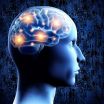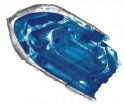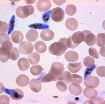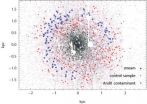(Press-News.org) In a study to be published in Psychological Science, researchers from Aarhus University and the University of Copenhagen demonstrate that brain cells in what is called the mirror system help people make sense of the actions they see other people perform in everyday life.
Using magnetic stimulation to temporarily disrupt normal processing of the areas of the human brain involved in the production of actions of human participants, it is demonstrated that these areas are also involved in the understanding of actions. The study is the first to demonstrate a clear causal effect, whereas earlier studies primarily have looked at correlations, which are difficult to interpret.
One of the researchers, John Michael, explains the process:
"There has been a great deal of hype about the mirror system, and now we have performed an experiment that finally provides clear and straightforward evidence that the mirror system serves to help people make sense of others' actions," says John Michael.
Understanding autism and schizophrenia
The study shows that there are areas of the brain that are involved in the production of actions. And the researchers found evidence that these areas contribute to understanding others' actions. This means that the same areas are involved in producing actions and understanding others' actions. This helps us in everyday life, but it also holds great potential when trying to understand why people with autism and schizophrenia have difficulties with social interaction.
"Attaining knowledge of the processes underlying social understanding in people in general is an important part of the process of attaining knowledge of the underlying causes of the difficulties that some people diagnosed with autism and schizophrenia experience in sustaining social understanding. But it is important to emphasise that this is just one piece of the puzzle."
"The findings may be interesting to therapists and psychiatrists who work with patients with schizophrenia or autism, or even to educational researchers," adds John Michael.
Facts about the empirical basis
The participants (20 adults) came to the lab three times. They were given brain scans on the first visit. On the second and third, they received stimulation to their motor system and then performed a typical psychological task in which they watched brief videos of actors pantomiming actions (about 250 videos each time). After each video they had to choose a picture of an object that matched the pantomimed video. For example, a hammer was the correct answer for the video of an actor pretending to hammer.
This task was intended to gauge their understanding of the observed actions. The researchers found that the stimulation interfered with their performance of this task.
Innovative method
The researchers used an innovative technique for magnetically stimulating highly specific brain areas in order to temporarily disrupt normal processing in those areas. The reason for using this technique (called continuous theta-burst stimulation) in general is that it makes it possible to determine which brain areas perform which functions. For example, if you stimulate (and thus temporarily impair) area A, and the participants subsequently have difficulty with some specific task (task T), then you can infer that area A usually performs task T. The effect goes away after 20 minutes, so this is a harmless and widely applicable way to identify which tasks are performed by which areas.
With continuous theta-burst stimulation, you can actually determine that the activation of A contributes as a cause to people performing T. This method thus promises to be of great use to neuroscientists in the coming years.
INFORMATION:
John Michael works for the transdisciplinary Interacting Minds Centre at Aarhus University. http://www.interactingminds.au.dk
In his work, he combines conceptual and experimental approaches to social interaction and social cognition.
Contact:
Tel.: (+45) 6073 9069
E-mail: johnmichaelaarhus@gmail.com
The article has been published recently in Psychological Science
New study settles how social understanding is performed by the brain
Understanding why people with autism and schizophrenia have difficulties with social interaction
2014-02-24
ELSE PRESS RELEASES FROM THIS DATE:
New process uses recyclable catalyst to create porous materials
2014-02-24
A team of UConn chemists has discovered a new way of making a class of porous materials that allows for greater manufacturing controls and has significantly broader applications than the longtime industry standard.
The process, more than three years in the making, has resulted in the creation of more than 60 new families of materials so far, with the potential for many more. The key catalyst in the process is recyclable, making it a 'green' technology.
"This is definitely the most exciting project I've been involved in over the past 30 years," says Board of Trustees ...
New insights into the origin of birds
2014-02-24
Mark Puttick and colleagues investigated the rates of evolution of the two key characteristics that preceded flight: body size and forelimb length. In order to fly, hulking meat-eating dinosaurs had to shrink in size and grow much longer arms to support their feathered wings.
"We were really surprised to discover that the key size shifts happened at the same time, at the origin of Paraves," said Mr Puttick of Bristol's School of Earth Sciences. "This was at least 20 million years before the first bird, the famous Archaeopteryx, and it shows that flight in birds arose ...
Policies to green the economy must underpin UK recovery: New report
2014-02-24
The UK urgently needs a green economic strategy to move towards low-carbon prosperity, resource security and environmental quality, says a new report published today by UCL's Green Economy Policy Commission.
The Commission – drawn from a range of academic disciplines across UCL – argues that the UK's current situation of climate instability and increasing resource constraints mean that decisive action is urgently needed by the UK government to green the economy.
Greening the Recovery argues that there is a window of opportunity for policies that acknowledge future ...
Mysterious polio-like illness found in 5 California children
2014-02-23
PHILADELPHIA – Researchers have identified a polio-like syndrome in a cluster of children from California over a one-year period, according to a case report released today that will be presented at the American Academy of Neurology's 66th Annual Meeting in Philadelphia, April 26 to May 3, 2014.
"Although poliovirus has been eradicated from most of the globe, other viruses can also injure the spine, leading to a polio-like syndrome," said case report author Keith Van Haren, MD, with Stanford University in Palo Alto, Calif., and a member of the American Academy of Neurology. ...
Scientists transform skin cells into functioning liver cells
2014-02-23
SAN FRANCISCO, CA—February 23, 2014—The power of regenerative medicine now allows scientists to transform skin cells into cells that closely resemble heart cells, pancreas cells and even neurons. However, a method to generate cells that are fully mature—a crucial prerequisite for life-saving therapies—has proven far more difficult. But now, scientists at the Gladstone Institutes and the University of California, San Francisco (UCSF), have made an important breakthrough: they have discovered a way to transform skin cells into mature, fully functioning liver cells that flourish ...
Oldest bit of crust firms up idea of a cool early Earth
2014-02-23
MADISON, Wis. – With the help of a tiny fragment of zircon extracted from a remote rock outcrop in Australia, the picture of how our planet became habitable to life about 4.4 billion years ago is coming into sharper focus.
Writing today (Feb. 23, 2014) in the journal Nature Geoscience, an international team of researchers led by University of Wisconsin-Madison geoscience Professor John Valley reveals data that confirm the Earth's crust first formed at least 4.4 billion years ago, just 160 million years after the formation of our solar system. The work shows, Valley says, ...
Researchers have identified a novel immunological mechanism of great importance for vaccine developm
2014-02-23
Researchers have discovered the presence of a novel subtype of innate lymphoid cells in human spleen essential for the production of antibodies. This discovery, published in the prestigious journal Nature Immunology, clears the path to the identification of novel strategies to develop more efficient vaccines against encapsulated bacteria, considered highly virulent.
This work was done by the B cell Biology research group at IMIM (Institut Hospital del Mar d'Investigacions Mediques) in Barcelona, directed by Dr. Andrea Cerutti, ICREA research professor and leader in the ...
A key protein is discovered as essential for malaria parasite transmission to mosquitos
2014-02-23
Two teams have independently discovered that a single regulatory protein acts as the master genetic switch that triggers the development of male and female sexual forms (termed gametocytes) of the malaria parasite, solving a long-standing mystery in parasite biology with important implications for human health. The protein, AP2-G, is necessary for activating a set of genes that initiate the development of gametocytes -- the only forms that are infectious to mosquitos. The research also gives important clues for identifying the underlying mechanisms that control this developmental ...
Stream of stars in Andromeda satellite galaxy shows cosmic collision
2014-02-23
The Andromeda Galaxy is surrounded by a swarm of small satellite galaxies. Researchers from the Niels Bohr Institute, among others, have detected a stream of stars in one of the Andromeda Galaxy's outer satellite galaxies, a dwarf galaxy called Andromeda II. The movement of the stars tells us that what we are observing is the remnant of a merger between two dwarf galaxies. Mergers between galaxies of such low mass has not been observed before. The results are published in the scientific journal, Nature.
The galaxies in the early universe started off small and the theory ...
Researchers pinpoint brain region essential for social memory
2014-02-23
NEW YORK, NY (February 23, 2014) — Columbia University Medical Center (CUMC) researchers have determined that a small region of the hippocampus known as CA2 is essential for social memory, the ability of an animal to recognize another of the same species. A better grasp of the function of CA2 could prove useful in understanding and treating disorders characterized by altered social behaviors, such as autism, schizophrenia, and bipolar disorder. The findings, made in mice, were published today in the online edition of Nature.
Scientists have long understood that the hippocampus—a ...
LAST 30 PRESS RELEASES:
Neuroticism may be linked with more frequent sexual fantasies
The ideal scent detection dog is confident, persistent and resilient, without insecurities or neuroticism, according to a study featuring Dutch police dog handlers
Elusive beaked whales off the Louisiana coast may sometimes be diving right to the seafloor, finds new 3D acoustic technology which accurately pinpoints their locations using their echolocation clicks
The vulnerable Amazonian manatee is most often found where human activity is low, with a new eDNA-based method most commonly detecting the freshwater mammal in the remote western Amazon
Dog behavioral traits are linked with salivary hormone cortisol and neurotransmitter serotonin
Breakthrough in human norovirus research: Researchers overcome major obstacle to grow and study the virus
Call for papers: 10th anniversary special issue of Big Earth Data
Embargoed: DNA marker in malaria mosquitoes may be pivotal in tackling insecticide resistance
Large increases in PM2.5 exposure from wildfires have exaggerated progress in reducing inequities in traditional sources of PM2.5 in California
Janus meta-imager enables asymmetric image transmission and transformation in opposite directions
Unlocking “hidden” modes: A new physics-driven approach to label-free cancer cell phenotyping
More isn’t always better: Texas A&M research links high-dose antioxidants to offspring birth defects
Study: Synthetic protein potentially improves outcomes for certain subgroups following intracerebral hemorrhage
Sub-shot-noise optical readout achieved in a Rydberg atomic medium
Unlocking dual-spin achromatic meta-optics with hybrid-phase dispersion engineering
On-chip dual microcombs drive nanomaterial-enhanced fiber sensors for high-selectivity multi-gas mapping
New transgenic zebrafish models decades of muscle atrophy in weeks
A double-edged sword: Chronic cellular stress promotes liver cancer—but also makes tumors vulnerable to immunotherapy
Ancient rocks reveal evidence of the first continents and crust recycling processes on Earth
Scientists build a "Rosetta Stone" to decode chronic pain neurons
Equity, diversity, and inclusion programs in health care institutions
Cost-effectiveness of semaglutide for secondary prevention of cardiovascular disease in US adults
A ketogenic diet for treatment-resistant depression
Terahertz microscope reveals the motion of superconducting electrons
Brain network responsible for Parkinson’s disease identified
In a study, AI model OpenScholar synthesizes scientific research and cites sources as accurately as human experts
New study reveals a minimalist bacterial defense that disrupts viral assembly
Scientists crack the rules of gene regulation with experimental elegance and AI
Scientists ID potential treatment for deadliest brain cancer
If you want to feel gratitude in your life, embrace nostalgia, VCU research finds
[Press-News.org] New study settles how social understanding is performed by the brainUnderstanding why people with autism and schizophrenia have difficulties with social interaction



